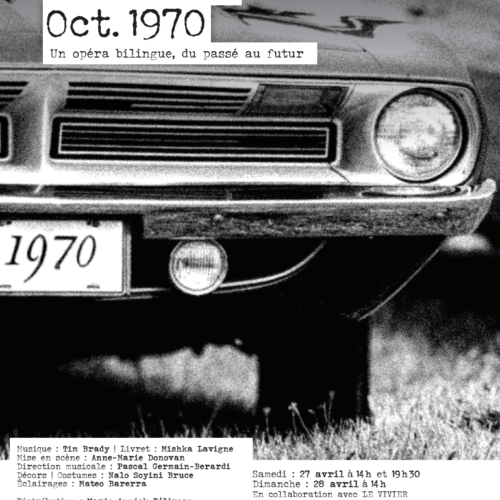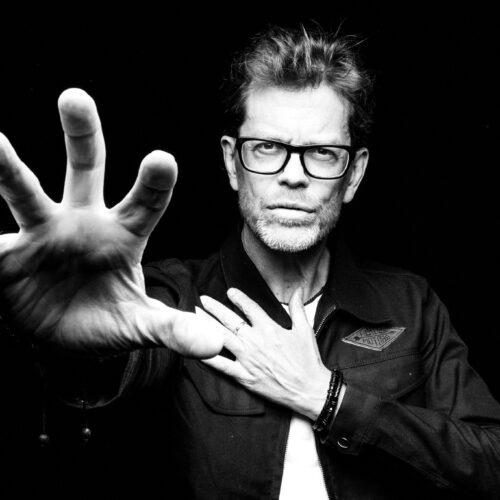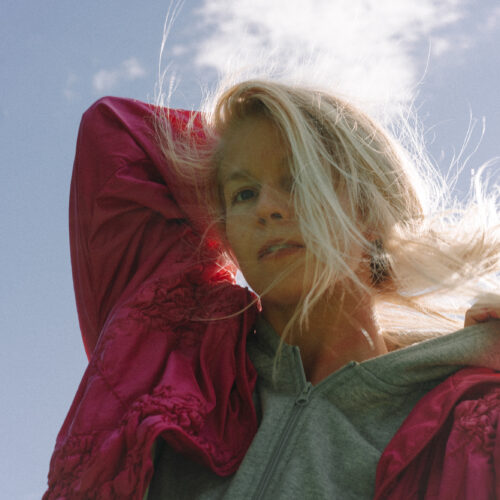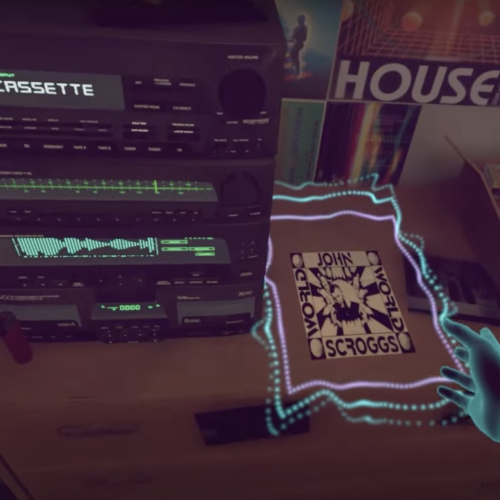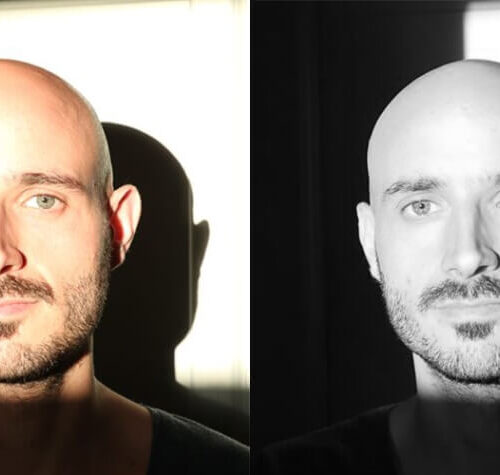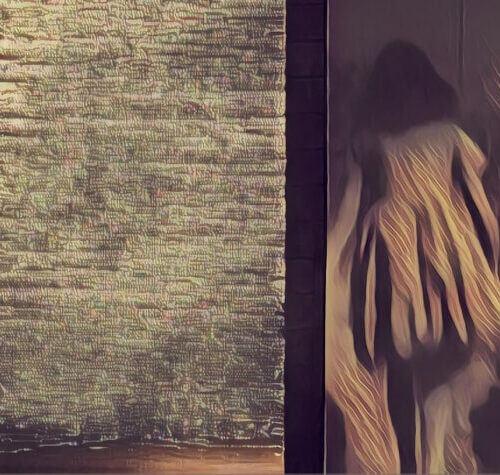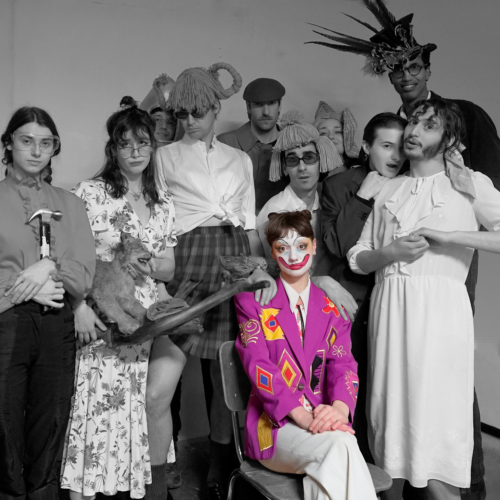renseignements supplémentaires
A pandemic, break-ups, relocations and a multitude of shows later, the members of Montreal band comment debord are back this Friday to recount their experiences of the last three years with monde autour, a second album with a folk, funk and disco feel. At Café Pista in Rosemont, PAN M 360 met with three of the band’s members, Rémi Gauvin, Karolane Carbonneau and Étienne Dextraze-Monast, to discuss their creative process, their second opus and much more!
In 2020, comment debord made a big impression with the release of their namesake album. The soft, intriguing voice of lyricist and lead singer Rémi Gauvin, catchy refrains, a sound proposal largely inspired by the ’70s and a laid-back universe: these are the things that made the septet stand out from the start.
With monde autour, the Quebecers return to the charge with a more assertive and controlled offering. This twelve-track project features dance-inducing tracks such as ”blood pareil”, as well as calmer, more introspective ballads like “c’est quoi l’affaire.” As usual, the lyrics are polished, poetic and punctuated with Quebecois references, much to the delight of listeners. Comment debord has certainly not disappointed with this release, and continues to blaze their trail in a little-explored groove on the Quebec music scene.
PAN M 360: It’s been almost three years (already) since the release of your first album. What has happened in your lives since then?
KAROLANE CARBONNEAU: Like everyone else, there was the pandemic. Technically, we were supposed to release our second opus last year. We had to wait another year because of the pandemic. It took almost a year to record monde autour.
ÉTIENNE DEXTRAZE-MONAST: Apart from the album, there were a lot of other things. I myself had a child. Some members of the group have gone through break-ups, while others are now in a relationship. Let’s just say there have been a lot of changes since the first album. We’ve aged a lot and are now in our thirties. The reality of adult life has arrived faster than we thought. We’re at the age where we can have children and own our own home!
RÉMI GAUVIN: Phew, I’m not going to become one just yet! As Étienne says, there’s a lot going on in our personal lives. As for the band, we’ve been lucky enough to tour a lot together. We’ve been able to get to know each other better on stage and experience how our songs are received by the public. It’s an essential dimension for our band.
ÉTIENNE DEXTRAZE-MONAST: That’s a really good point Rémi makes. We’ve played a lot of venues all over Quebec, and that’s helped us discover our audience. We love talking to people after shows, and we’ve had some great encounters. Knowing that we’re not making music in a vacuum and that there are people out there listening to us, has given us confidence.
PAN M 360: How did the pandemic affect the creation of your new project?
KAROLANE CARBONNEAU: For a long time, we couldn’t meet in person. This made the creation quite different. Rémi would send us different mock-ups by e-mail and we’d all try to add a little something to them. We’d never worked that way before, so it was a big change for us.
ÉTIENNE DEXTRAZE-MONAST: Some of the songs on monde autour were written 100% remotely, while others were created when we were all together. There’s a hybrid side to the creation of this album. We had no choice but to develop new creative tools and do things differently. We were more spontaneous in the development of the project. For example, some tracks were recorded just a few days after Rémi had finished writing them. It’s quite different from the first album because these were songs we’d already been playing live for two years.
KAROLANE CARBONNEAU: It’s true that we were more spontaneous, but it wasn’t because we were lazy. I think we just wanted to give ourselves a certain freedom in the studio. We didn’t want to think too much, and I think that works with our music. When you’re creating, a lot of things come together in the moment, and that’s the beauty of it.
PAN M 360: How do you create music when several people are involved?
RÉMI GAUVIN: It definitely takes good communication. Everyone has to be willing to put water in their wine and have a common vision. It’s also important to put our egos aside and be at the service of the songs. We’re all learning to do that better and better.
KAROLANE CARBONNEAU: There’s an expression that says you have to trust the process, and that’s really what you have to do, especially when you’re creating with several people. You have to trust the skills of the different members.
ÉTIENNE DEXTRAZE-MONAST: Some pieces come together so spontaneously and everything falls into place, while others take longer to come together. You have to talk a lot and agree on the vision of the pieces. Sometimes we don’t all see the songs in the same way, and we have to find common ground to allow us to evolve.
PAN M 360: How do you go about writing your songs?
RÉMI GAUVIN: The lyrics are really up to me. Let’s just say the others have to trust me haha! For our second album, I worked on the lyrics at different times. Sometimes I came up with less complete pieces, with just a verse and a chorus. We’d work a bit on the music, then I’d go back and work on the lyrics, and so on. There was a lot of that going on with the writing around the world. I write quite intuitively.
PAN M 360: As on your eponymous album, monde autour also features little writing gems such as “je sais sweet fuckall pourquoi j’ai l’impression d’avoir trouvé quelle couleur crier après le ‘Omnikin'” in tranquillement pas vite. Where does the inspiration for such lyrics come from?
RÉMI GAUVIN: Honestly, there’s no real secret. As soon as I get an interesting idea or a flash of inspiration, I jot it down somewhere and use it later. I write down a lot of things, both expressions and concepts and put them into songs. As for the line about Kin-Ball, it’s a memory I had when I was a supply teacher in a secondary school. One day when I was a physical education teacher, I saw a Kin-Ball and it reminded me of my youth. I never played the sport, but I remember it fascinated me. Kin-ball players were very much associated with their colour, it was almost part of their identity.
ÉTIENNE DEXTRAZE-MONAST: Rémi uses lots of images and references that speak to people who are currently in their twenties and early thirties. The Kin-Ball line is an excellent example. He also uses a lot of Quebecois expressions and references, and that’s really cool. He uses images that are common to many people, takes them out of context and presents them in a different light. That’s the beauty of his writing, and that’s what makes it poetry.
PAN M 360: Your first opus allowed us to discover you and get to know your universe. What would you say this second project allows us to learn about your background?
ÉTIENNE DEXTRAZE-MONAST: You’ll learn that we know each other better musically. Our sound is more coherent and confident. We’re also more composed and less angry. We’ve found what we believe to be our identity as a band, as much in the poetry as in the music and arrangements. We’re also definitely more mature than on our first project. We’ve developed a better way of working, and it shows in the world around us. Through our new tracks, people will be able to learn about who we’ve become and what we’ve been through over the last few years.
PAN M 360: The cover of your new project features a magnificent fresco of flowers by Julien Cayla-Irigoyen. Flowers were also present on those of your two recent singles. Tell me more about your floral penchant.
RÉMI GAUVIN: There are folk and Québécois influences on the album. The concept with graphic designer and illustrator Julien was to draw inspiration from the flowers that grow here. We read different Quebec flower books for inspiration. The different flowers and colours represent diversity and cohabitation. In our training, we find different personalities. In a way, that’s what the flowers represent. Julien came up with different suggestions and was very creative. It was always very beautiful, and we decided on this illustration. We’re really happy with the album cover.
PAN M 360: One of my favourite tracks from your project is “tough luck.” What’s the story behind this track?
RÉMI GAUVIN: It’s one of the first songs we wrote for the album. It’s a song that talks indirectly about the attitude we should have in life. Everything can be improvised, and there’s no way of knowing what’s going to happen to us. I say “ça va peut-être tomber en neige, ça va tomber en pluie”, and that’s really the theme of the song, the uncertainty of life. During the pandemic, life was full of uncertainty, on a professional, social and personal level. It also refers to making music. We’re not sure where it’s going to take us, but we know it’s worth doing. I think there’s something really beautiful about it.
PAN M 360: The song “tranquillement pas vite” is sung by a member whose voice we’re not used to hearing. Who is it? Is it a desire to bring the different members to the fore vocally?
RÉMI GAUVIN: It’s Willis Pride. It’s the first time he’s had a song of his own on one of our projects. On our first album, we had different members appearing vocally. It’s something we like to do.
ÉTIENNE DEXTRAZE-MONAST: Indeed, we like to do it when it serves the song. Rémi tries to sing the songs he’s written, and when that doesn’t work, we find solutions like having another member sing them. Sometimes it works and sometimes it doesn’t. When Karolane sings Rémi’s lyrics, it takes on a whole new meaning. That’s exactly what happened with Willis for “tranquillement pas vite.” He took Rémi’s song, went to his place and rearranged it. It was really interesting and brought the song to its full potential.
PAN M 360: You’ve already made three videos for around-the-world titles, most recently for “veux pas.” At a time when music videos are being pushed aside by artists, why do you think it’s important to make them?
KAROLANE CARBONNEAU: I think it adds to the image people have of us. It gives another life and another dimension to our songs.
ÉTIENNE DEXTRAZE-MONAST: During the pandemic, I was a music teacher at an elementary school. When I told the kids I was in a band, they all wanted to see what I was doing. Their first reflex was to go to YouTube and type in the name of our band. It’s pretty anecdotal, but it proves that videos still have their place. Also, it’s extra content and allows us to show more to our audience. It lets people see us and gives our songs an atmosphere. When we make videos, we meet some really great artists. So we broaden our horizons and it’s great to collaborate with artists who aren’t necessarily musicians. It makes our art multidisciplinary.
PAN M 360: You’ll be making your Montreal debut at Club Soda on November 3. What can we expect from this concert?
KAROLANE CARBONNEAU: To a great show. We want to do something unique. We can’t reveal too much, but there might be guests. I think it’s going to be worth it!
ÉTIENNE DEXTRAZE-MONAST: We’ve been working on this show for a few months, and we’re still making changes. This show will open our upcoming tour. It’ll be our biggest venue yet, and a lot of our friends will be there. It’s going to be a lot of fun, that’s for sure.
Comment debord is performing at FME on Sunday, 5 PM
Photo credit : Audiogram


